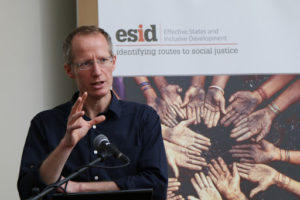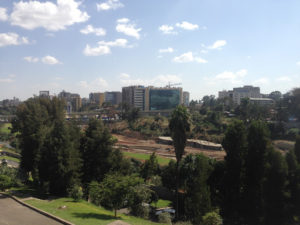The politics of responding to Covid-19 in developing countries: PART 1
21 April 2020 Sam Hickey, Tim Kelsall, David Hulme We are launching a series of blogs on the politics
ESID research featured in The Washington Post
3 February 2020 Tim Williams' award-winning research on the political economy of primary education, published by ESID and World Development,
Gender equitable change and the place of informal networks in Uganda’s legislative policy reforms
Working paper 134 Download pdf Josephine Ahikire and Amon A. Mwiine Uganda has had an uneven history and experience around

Podcast with Duncan Green – What are the headlines of nine years of research into Effective States and Inclusive Development?
https://soundcloud.com/globaldevinst/sam-hickey-research-findings-on-effective-states-and-inclusive-development At the end of ESID's recent amazing three-day conference Duncan Green sat down with our Research Director, Sam Hickey, and asked
Abstracts for Conference 2019
All abstracts are below - click on paper titles to expand. Rooms are given after panel titles, e.g. 'D7'. Monday
Will South Asia achieve the Sustainable Development Goals by 2030? Learning from the MDGs experience
Working paper 126 Download pdf M. Niaz Asadullah, Antonio Savoia and Kunal Sen This paper contributes to the debate on the Sustainable Development
Five ESID books are open access and free to download
26 June 2019 With the recent publication of two new books, The Politics of Education in Developing Countries and Negotiating

Productivist social protection in Ethiopia’s ‘developmental state’
12 June 2019 Tom Lavers Two recent ESID papers published in African Affairs and Social Science and Medicine (both open
Service delivery reform in Nigeria: The rise and fall of the Conditional Grant Scheme to Local Government Areas (CGS to LGAs)
Working paper 114 Download pdf Bala Yunusa Yusuf and David Hulme This paper analyses Nigeria’s Conditional Grant Scheme to Local
Professor Ursula Hoadley
Role Ursula Hoadley is an Associate Professor in the School of Education at the University of Cape Town. She works
EVENT – Discussion on ESID's findings at University of Cape Town
If you are able to be in Cape Town this Thursday, don't miss the opportunity to join our leading researchers, Prof
Bangladesh is booming, but slide towards authoritarianism could burst the bubble
25 March 2019 M Niaz Asadullah & Antonio Savoia This post was first published in The Conversation
Mohammed Awal
Role Mohammed Awal is a research analyst, and social accountability programming team lead at the Ghana Centre for Democratic Development
Understanding the politics of the learning crisis
7 March 2019 Expert on education and development, Professor Lant Pritchett, reflects on what he thinks are three highlights
Professor Anne Mette Kjær
Role Anne Mette Kjær is a Professor at the Department of Political Science, Aarhus University, Denmark. She is currently coordinating
How can developing countries learn to tax?
28 January 2019 Antonio Savoia, Roberto Ricciuti and Kunal Sen This blog was first published on OECD Development Matters The
Workshop: Rethinking social justice and the public realm: what can relational approaches offer?
Rethinking social justice and the public realm: what can relational approaches offer? On Thu 1st and Fri 2nd November ESID
Global development post-2015: some reflections on convergence and what facilitates it
Antonio Savoia and David Hulme explore what we know and what we should ask next about developmental convergence.
New books launching at DSA
28 June 2018 Today we're excited to be launching two new ESID books at the DSA Conference: Governing Extractive Industries,
The Development Studies Association Conference, Manchester – 27 – 29 June 2018
18 June 2018 A number of ESID academics are convening panels and giving papers at this year's Development Studies Association
Tim Williams wins 2018 Joyce Cain Award for outstanding scholarly article
2 April 2018 We are thrilled that ESID researcher Tim Williams’s paper on the politics of education policy in
Understanding the contribution of the BSUP (JNNURM) to inclusive cities in India
Working paper 97 Download pdf Sundar Burra, Diana Mitlin and Gayatri Menon with Indu Agarwal, Preeti Banarse, Sharmila Gimonkar, Maria Lobo, Sheela Patel,

